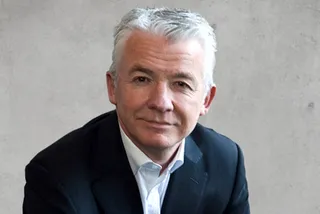
Alan O'Neill: The Real Mr Selfridge?
We recently caught up with change management consultant and speaker, Alan O’Neill. You may not be overly familiar with his name but you will have heard of the brands he’s worked with; most notably Selfridges.
Since working with the department store he implemented an extensive change programme; overhauled company culture and improved customer service, and has – as a result – been named ‘the best department store in the world’ (by their peers) for the third consecutive time. Quoting Alan himself he highlights they also grew ‘ebit by 230% and Customer Service by 27%’.
Alan is not however all about retail. His vast experience has had him working, by his own admission, in every conceivable sector and industry over the years which has included the following brands: AIB Bank, Bulmers, Chevron, Glanbia, Intel, Kizad, Lavazza, Nissan, Symantec, Vodafone etc.
Alan is a mix of supreme confidence, empathy and understanding with those he works with; he is direct, articulate, and delivers his messages with clarity and with a sizeable dose of Irish charm.
We started by asking about Selfridges...
SC: You were brought in to revitalise Selfridges – leading to them winning the award for best department store (three times!): what would you say the most challenging aspect of that ‘change’ process was?
AO: As is typical in change programmes – getting people on board was the biggest challenge. Although we planned and communicated extensively, some long timers had difficulty with new challenges and new ways. Over time, we lost some people – good and bad. Some of the good ones we’d prefer to have retained, but if that’s how they feel, it’s better to give them their wings and let them find their magic elsewhere.

Selfridges lit up for Christmas
SC: The Americans have historically been lauded for their customer service skills. Where do you think the UK compare now or do we simply have two distinctive approaches that work for us?
AO: The Americans are indeed way ahead of us Europeans for consistent service. It’s well embedded in their national culture more than it is here. Some Europeans might suggest that service in the US is not genuine – that it’s fake or performed just for the tip. Whether that’s true or not, which would you prefer to be served by? A sometimes robotic American or a grumpy European who doesn’t smile, make eye contact or thank you. My own experiences in the US have been positive in the main. I think we’re getting better in Europe in pockets – but we have a looooong way to go.
SC: It is sometimes seen that larger companies tend to lose their customer focus. Why is it then a company like Pret a Manger can get customer service right across multiple locations (in sometimes very busy environments) and a similar independent smaller chain get it so wrong?
AO: To get that consistency day in day out requires a number of factors… the organisation has to first of all set the standard and communicate/train that out to all. The managers have to be on the floor most of the time to support and challenge where necessary – and to identify, reduce, eliminate or mitigate obstacles to giving service. In a nutshell – it’s about culture.
SC: Is it possible to define company culture?
AO: Yes it is. It’s usually anecdotal however, made up of… statements of vision and mission… artefacts like logos and other collateral… jokes and myths… processes… behaviours and values. We Irish for example have a very strong culture of heritage, pride and patriotism. We’re also incredibly handsome, charming, charismatic and enjoy the craic (!!!!!!!!). That’s national culture and it’s strong. But of course every country has its own culture. (It’s just that the Irish culture is so attractive ;-). Anyway, organisations can similarly have strong cultures if they take control and own their culture. By that I mean they should plan the culture that is right for their business. If they don’t, they’re going to get one anyway and it mightn’t be the right one.

Culture, Change & Customer Service
SC: You’ve worked across many sectors on the culture, change and customer service fronts – recently telling us that you can’t think of a sector you’ve not worked in – have you noticed any over arcing trends and/or changes in the last 20 years?
AO: Wow – I could write books on that. In face I am, so watch this space. But for now.... the pace, the volume and the speed of change is increasing exponentially. It’s truly scary and it means that we all have to develop new skills. A key new skill is the ability to adapt and engage with change and to control it. ‘Do’ rather than ‘be done to’.
SC: With the growing reliance on technology to engage with products and services, how can customer service still inform that process if customers are buying remotely?
AO: Some key principles apply regardless of the channel that the customer buys through. In a nutshell, customers judge us by our product range, our people and our delivery channel or efficiency of our route to market. With an on-line purchase, the weighting shifts from human interaction to ease of navigation and so on. People are still important because even with digital shopping, there is often a human involved - whether it’s a response to a mail, a telephone call, click and collect etc.
We’d like to thank Alan for taking the time answer our questions and of course Alan is available to elaborate much further in a speech. As alluded to above, he works closely with clients to tailor his speeches to that client’s needs ensuring they get the most effective message on the day.
For more information please call the office on the number below or email us.
Selfridges Picture: © Copyright Richard Croft and licensed for reuse under this Creative Commons Licence .
Have an enquiry?
Send us a message online and we'll respond within the hour during business hours. Alternatively, please call us our friendly team of experts on +44 (0) 20 7607 7070.
